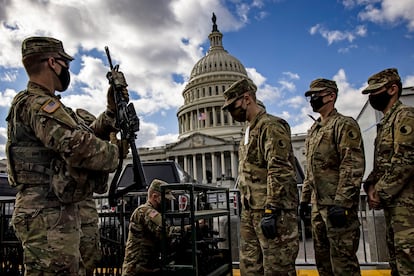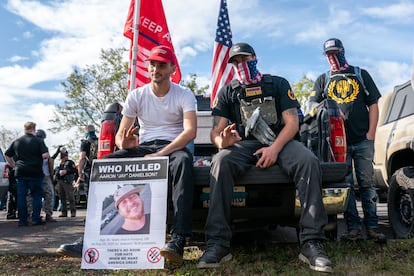Fear of a second US Civil War ignites debate
The hearings into the Capitol insurgency and a climate of political fracture have led experts to ask if the country is headed for another fratricidal conflict


There are words that refuse to coexist lightly. “Civil” and “war” are two of them. However, these words are being heard together incessantly in the United States. And these are not the jeremiads of a handful of extremists: they have resounded in the mouths of congressmen over the course of the six weeks of hearings held by the House Select Committee to Investigate the January 6th attack on the United States Capitol, as well among the insurgents who participated in the assault and supporters of Donald Trump who jumped off the train that was heading at full speed towards a coup d’état. They are also appearing more frequently in essays and in media and academic articles, as well as in speeches by moderate politicians.
It may sound exaggerated - and it would not be unusual if it did: simplifying and exaggerating are national sports in this society - but, argues Barbara F. Walter, professor of political science at the University of California, it may also have seemed absurd during the months or years leading up to conflicts erupting in the places she studies - from Yugoslavia to Syria to Iraq – in order to understand what has led to violence repeatedly breaking out over the past three decades, and the lessons that can be learned to prevent it from happening again. “As I was engaged in that work, I realized something disturbing: the signs of instability that we identify in other countries are the same ones that I have begun to see in my own country,” she writes in How Civil Wars Start.
Walter chooses her words carefully. And it is grimly persuasive when, for example, she argues that the United States meets the two requirements that are most repeated when fratricidal conflict is imminent. Firstly, the US has fallen into the group of countries that Virginia think tank the Center for Systemic Peace terms as “anocracies,” nations whose system of governance falls somewhere between a democracy and an autocratic state: two systems that, for diametrically opposed reasons, never slide into civil war, Walter notes.
The second risk factor arises when political parties begin to organize themselves on either side of red lines based on “race, religion or identity,” features that Walter says can be observed in the cultural war being waged by Republicans and Democrats. In her view, “the attack on the Capitol and the politicization of the use of masks during the pandemic” are two manifestations of something that comes from further afield: “In the last decade, inequality has grown and our institutions have weakened [citizen trust is at historic lows, according to a survey released this week by Gallup]. Americans are increasingly captive to demagogues, via their screens and via their governments.” And what is of even more concern in the short-term: “Violent extremist groups, especially those of the radical right, are more robust than ever, although their growth may seem imperceptible.”

Essayist Stephen Marche, author of The Next Civil War. Dispatches from the American Future, a provocative work of “speculative nonfiction” from its opening paragraphs, believes: “The United States is coming to an end. The question is how.” Marche recalls a telephone conversation during which Foreign Policy magazine “In the aftermath of the election of Donald Trump, asked a group of national security experts to evaluate the chances of a civil war in the next 10 to 15 years.”
“The consensus stood at 35%,” he says. “A 2019 Georgetown University poll asked registered voters how close they believed the country was to the brink of civil war, on a scale of 0 to 100. Their median response was 67.23 points.”
What took place between one survey and the more pessimistic one is, of course, the presidency of Donald Trump, which he rang in by stating on the steps of the Capitol: “This American carnage stops right here and stops right now.” His successor, Joe Biden, confessed to a congressman shortly before Election Day: “I certainly hope this works. If not, I’m not sure we’re going to have a country.” Biden’s admonition is echoed by Jonathan Martin and Alexander Burns in the recently published This Will Not Pass: Trump, Biden and the Battle for America’s Future.
A divided country
However, it would be unfair to place the entire blame on Trump, who noted in 2017: “I didn’t come along and divide this country. This country was seriously divided before I got here.” The latest dispatch from the future of the United States arrived this week from Kentucky, and it broadly backed Trump’s statement. There, a man named C. Wesley Morgan, who made his fortune through a liquor store empire, lost one of his daughters to a deranged killer who broke into his mansion. A bunker he had built “to protect himself in case of civil war” proved of little use. Morgan constructed the bunker during the Barack Obama administration, at a time when he was convinced that society was “on the brink of collapse.”
“Of course, no prediction is set in stone, but I think it is undeniable that the system is crumbling, that political violence is on the rise, and that there are two halves of the United States that not only do not share political ideas, but do not even share the most basic consensuses about reality. Some might argue that these convulsive episodes already occurred in the 1960s and 1970s,” says Marche, a Canadian national. “But I fear on this occasion we will not overcome them with hedonism and suddenly find ourselves in a new disco era.” The author recalls that when he was writing his book, which he started working on after attending Trump’s inauguration, his friends and his publishers tried to talk him out of his “alarmism.”
“‘You’ll see, an external enemy will come along that will unite us all,’ they told me. The pandemic came, and it made matters worse. After January 6, they breathed a sigh of relief: ‘Well, now you won’t publish it, because after this there is no other option but to reconcile as a society.’ I had to try hard not to laugh in their faces,” he says. The book was finally published six months ago and since then Marche says he has seen further evidence piling up that supports his theories. The most recent two examples: the mass shooting in a Buffalo supermarket perpetrated by a young man intoxicated by white supremacism that cost the lives of 10 African-Americans, and the arrest of an armed man with homicidal intent in the vicinity of the Washington suburban home of Supreme Court Justice Brett Kavanaugh.
In a country that has more weapons (about 390 million) than inhabitants (332 million) and in which a candidate for the Senate, Eric Greitens, can run an election ad in which he fantasizes about killing Rinos (Republicans in name only), both Marche and Walter point to the same case as paradigmatic of a new and ominous reality: the arrest in October 2020 of 13 people suspected of plotting to kidnap the Democratic Governor of Michigan, Gretchen Whitmer. Their intention was to try her for treason (against personal autonomy, that is) due to the lockdowns she had ordered during the coronavirus pandemic, and execute her. Half of the suspects were linked to a local militia, the Wolverine Watchmen, which has links to other far-right groups that played a key role in the attack on the Capitol, such as the Proud Boys and the Oath Keepers, whose leader, Stewart Rhodes, said in an interview with The Atlantic published in November 2020, two months before the assault on the Capitol: “Let’s not fuck around. We are already in a civil war.”
Marche notes that, according to the metrics of the Oslo Peace Research Institute, 1,000 combatant deaths are needed in a year to prove Rhodes right. “The definition of civil conflict [or civil strife, the step preceding civil war] begins with 25 deaths in a year. In the United States, anti-government extremists killed 42 people in 2019; in 2018, 53; in 2017, 37; in 2016, 72, and in 2015, 70″.
Those groups were the focus of one of the sessions held by the House Select Committee, during which Democratic Congressman Jamie Raskin attempted to demonstrate the relationship between what Trump said and did in the days before January 6 - and during the fateful day itself - and the violence unleashed by the militiamen who answered his call to descend on Washington: “Be there. Will be wild!” the former president promised his supporters in a tweet. Raskin, a brilliant orator who sprinkles his speeches with references to the intellectual and political history of the founding and reconstruction of the United States, concurs with the rest of the experts consulted for this article in that, if it does come to pass, the second United States Civil War will not resemble the first (1861- 1865). “I don’t think we will witness a fully militarized conflict,” the rising democrat told EL PAÍS. “But I do believe that if we don’t account for the insurrectionalism that was organized that day, we will witness greater racial, ethnic, political and ideological violence between certain communities, especially at certain times, such as during elections or at public events. In other words, we are in danger of becoming much more like Northern Ireland.”

Raskin’s referral to The Troubles - the name by which the 30-year conflict in Northern Ireland is known - is a constant feature in the rhetoric of those who are warning of another civil war in the US. The comparison worries Dubliner Fintan O’Toole, a regular at The New York Review of Books magazine, where he writes about American politics. His latest book is a “personal history” of his country. “It is important to remember that the conflict in Northern Ireland never turned into a civil war,” he says in an email. “There were regular acts of extreme violence by paramilitary groups and violent responses by the state, but that, as Spain knows perfectly well, does not constitute a civil war. That is not to say that what happened in Northern Ireland wasn’t terrible, or that a conflict of this kind isn’t horrific. It is, and it’s not inconceivable that the United States could slide into that kind of low-level, sustained political violence. But calling this a civil war does not serve, instead it feeds the toxic mentality of those who want to see violence on a large scale.”
A peaceful secession
Agnieszka Paczynska, from the School of Conflict Analysis and Resolution at George Mason University in Fairfax, Virginia, does not belong to the group cited by O’Toole but during a conversation in a Washington café she also states her belief “that there may be a fracturing or that, out of nowhere, California decides to become independent. After all, it is one of the largest economies in the world.” For Paczynska, the problem is rooted in a system that fails, for example, in the distribution of electoral votes, which means that “a place like Wyoming [580,000 inhabitants] has two senators, the same number as California [39 million]. To alter that, the Constitution would have to be altered and you’d have to persuade members of the [Republican] party that would lose out on the basis of this new distribution to vote in favor of it. Why would they do that?” she asks.
This idea of a division of the country – which it might be advisable to organize peacefully before it is too late – arises often in the conversation these days: “Secession would not be a failure, given the current tensions,” Marche believes. Perhaps the union was just a 160-year mirage. “In reality, we have never been a nation. We are more like a federated republic of two nations: the Blues [Liberals] and the Reds [Conservatives]. It is not a metaphor; it is a geographical and historical reality,” analyst Michael Podhorzer recently wrote in his influential newsletter. “Both spatially and culturally, it corresponds to the divisions between the Union and the Confederacy.” That division is clearly evident at levels as basic as school boards, which the pandemic turned into political battlefields, and in issues such as abortion: the recent Supreme Court ruling overturning Roe v. Wade, and thusly the federal right to abortion, has drawn up a de facto map of permissive and restrictive states reminiscent of the Civil War.
Podhorzer agrees with other analysts that the problem is not so much a possible civil war, but that the United States will end up in the embrace of authoritarianism. He also believes that the first move of that game has already been lost along with control of the Supreme Court. This drift towards authoritarianism also concerns Jason Stanley of Yale University, who in an article published in The Guardian states that “the contemporary American fascist movement is led by oligarchic interests for whom the public interest is a nuisance, such as those in the hydrocarbon business, as well as a social, political and religious movement with roots in the Confederation. As in all fascist movements, these forces have found in the figure of Trump a popular leader not subject to the rules of democracy.”
All of those involved in this debate agree on at least one thing: whether it is civil war, a future tinted by fascism or secession, premonitions are abundant and becoming impossible to ignore. Marche consoles himself with the thought that “if there is any country capable of large-scale political reinvention, it is the United States.” O’Toole, on the other hand, prefers to turn to a European scholar, Hans Magnus Enzensberger, who wrote in the 1990s: “There is no useful civil war.”
Meanwhile, the leftist Bernie Sanders went viral this week with a video in which a supporter came to him in search of advice of how to avoid, given the circumstances, descending into fatalism and the “loss of all hope.” “These are very tough times and it’s important to be honest about that. But these are not the only difficult times we have been through as a nation. Don’t get caught up in pessimism. Things change. They improve. That is why it is important not to give up the fight”, the veteran senator replied.
Tu suscripción se está usando en otro dispositivo
¿Quieres añadir otro usuario a tu suscripción?
Si continúas leyendo en este dispositivo, no se podrá leer en el otro.
FlechaTu suscripción se está usando en otro dispositivo y solo puedes acceder a EL PAÍS desde un dispositivo a la vez.
Si quieres compartir tu cuenta, cambia tu suscripción a la modalidad Premium, así podrás añadir otro usuario. Cada uno accederá con su propia cuenta de email, lo que os permitirá personalizar vuestra experiencia en EL PAÍS.
¿Tienes una suscripción de empresa? Accede aquí para contratar más cuentas.
En el caso de no saber quién está usando tu cuenta, te recomendamos cambiar tu contraseña aquí.
Si decides continuar compartiendo tu cuenta, este mensaje se mostrará en tu dispositivo y en el de la otra persona que está usando tu cuenta de forma indefinida, afectando a tu experiencia de lectura. Puedes consultar aquí los términos y condiciones de la suscripción digital.








































